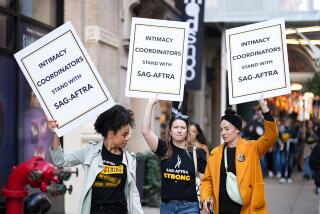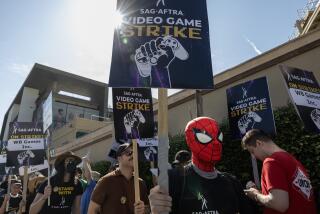SAG-AFTRA seeks strike authorization as contract deadline nears
In a sign of rising labor tensions, SAG-AFTRA is seeking a strike authorization from its members as it continues to negotiate a new three-year contract with the major studios.
The actors’ union said in a message to members that the two sides have failed to reach a tentative contract agreement after the studios proposed “outrageous” rollbacks.
SAG-AFTRA said its national board of directors agreed on Sunday to send a strike authorization referendum to members unless a satisfactory agreement is reached by Friday’s contract deadline.
The studios have “failed to make sufficient progress on our most critical issues,” the guild’s leaders said in a message posted to its website Sunday night. “The status quo is simply unacceptable and our members, standing together, will not give in to management’s onerous demands nor back down on our critical proposals.”
SAG-AFTRA is negotiating the contract with the Alliance of Motion Picture and Television Producers, the trade association that represents the major Hollywood studios, broadcast networks and certain cable channels.
The AMPTP declined to comment, citing a media blackout for the negotiations.
A strike authorization vote doesn’t necessarily mean a strike will happen. The move is a common tactic used by unions to gain leverage in a negotiation.
In April, members of the Writers Guild of America voted to authorize a strike in its negotiations with the AMPTP. But the union narrowly avoided a strike by reaching an agreement with the studios in early May.
SAG-AFTRA was formed in 2012 with the merger of the two rival guilds. The combined organization is Hollywood’s largest union and boasts membership of approximately 160,000 individuals, including actors, announcers, broadcast journalists and voice-over artists.
The actors’ union is currently several months into a strike against major video game companies over compensation and safety for voice-over and motion-capture performers.
More to Read
Inside the business of entertainment
The Wide Shot brings you news, analysis and insights on everything from streaming wars to production — and what it all means for the future.
You may occasionally receive promotional content from the Los Angeles Times.











